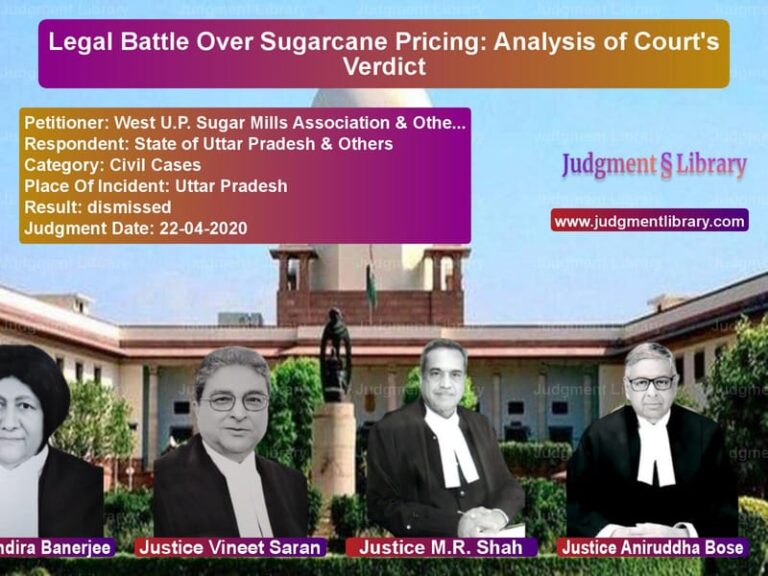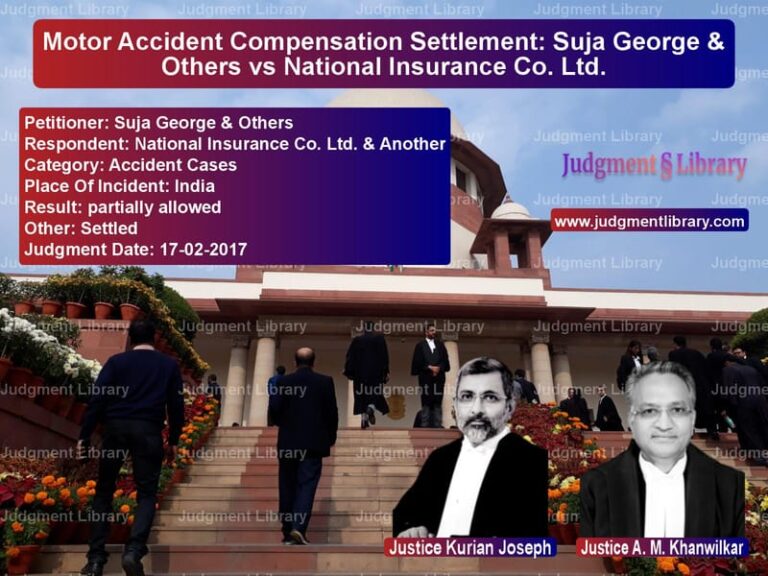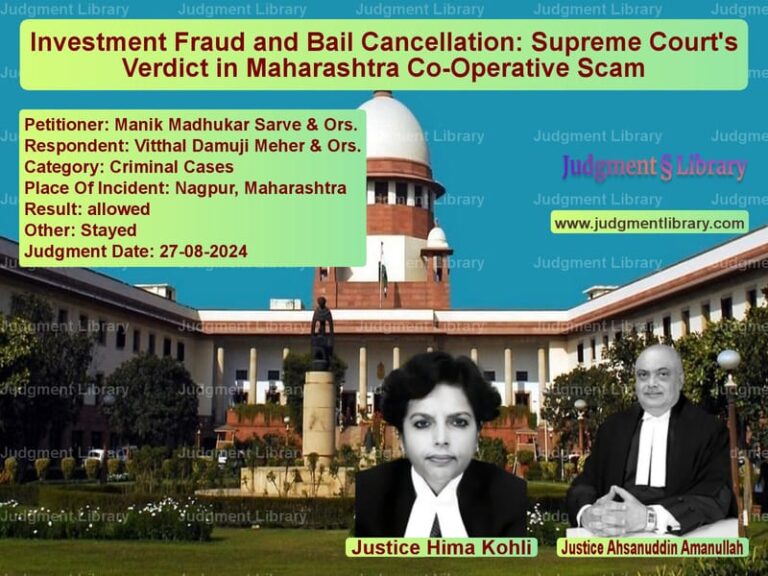Liability for Electricity Dues in Auction Sales: Key Ruling in Telangana State Southern Power Distribution Company vs. M/S Srigdhaa Beverages
The case of Telangana State Southern Power Distribution Company Limited & Anr. vs. M/S Srigdhaa Beverages revolves around the issue of whether the liability for outstanding electricity dues of the previous owner of a property can be transferred to the subsequent purchaser in an auction sale under the Securitisation and Reconstruction of Financial Assets and Enforcement of Security Interest Act, 2002 (SARFAESI Act). The respondent, M/s. Srigdhaa Beverages, was the successful bidder in the auction conducted by Syndicate Bank for a unit owned by M/s. SB Beverages Private Limited, which failed to pay its dues. The issue in question was whether the respondent, as the auction-purchaser, could be held responsible for the electricity dues of the previous owner.
The respondent purchased a unit that was previously owned by M/s. SB Beverages. The unit, a mineral water bottling plant, was auctioned after the previous owner’s default on financial obligations. The auction notice, however, specifically indicated that the property was being sold on an “AS IS WHERE IS, WHATEVER THERE IS AND WITHOUT RECOURSE BASIS.” Following the purchase, the respondent applied for an electricity connection for the unit but was informed that there were outstanding electricity dues amounting to Rs. 50,47,715, which were incurred by the previous owner. The appellants, Telangana State Southern Power Distribution Company, claimed that the respondent should clear the outstanding dues as per the terms of the General Terms and Conditions of Supply.
The respondent contested this claim, arguing that as the new purchaser of the property, they were not liable for the previous owner’s dues. The respondent filed a writ petition before the High Court of Telangana and Andhra Pradesh, challenging the demand for payment of the electricity dues. The High Court ruled in favor of the respondent, setting aside the demand for the electricity dues and holding that the respondent, as the auction-purchaser, was not liable for the outstanding dues of the previous owner.
The appellants, in turn, challenged the High Court’s ruling, leading to the present appeal before the Supreme Court. The key issue before the Supreme Court was whether the liability for the previous owner’s electricity dues could be transferred to the respondent, who had purchased the property in the auction. The appellants relied on specific clauses in the General Terms and Conditions of Supply that stipulated that the seller must clear all dues before selling the property, while the respondent argued that such dues could not be transferred without specific contractual obligations.
Background of the Case
The respondent, M/s. Srigdhaa Beverages, purchased the mineral water bottling plant located on a one-acre plot in Rampally Village, Keesara Mandal, Medchal District. The sale occurred through an e-auction conducted by Syndicate Bank to recover dues under the SARFAESI Act. The auction notice explicitly stated that the property was being sold on an “AS IS WHERE IS” basis, which meant that the buyer would take the property in its current state, including any existing liabilities, whether known or unknown. The sale was made subject to statutory dues, including any encumbrances such as property tax, water, sewerage, and electricity bills.
The respondent was subsequently informed by the Telangana State Southern Power Distribution Company (TSSPDCL) that there were outstanding electricity dues of Rs. 50,47,715. This amount was linked to the electricity consumed by the previous owner, M/s. SB Beverages. The appellants asserted that the respondent, as the new owner of the property, was legally obligated to settle these dues before obtaining the electricity connection for the plant. The respondent, however, disputed this claim, asserting that the electricity dues of the previous owner should not be transferred to them, as they had no legal obligation to settle those debts.
The dispute escalated to the High Court, where the respondent’s claim was upheld. The Court ruled that the respondent, as a subsequent purchaser, was not responsible for the unpaid electricity dues of the previous owner. The Court relied on previous judgments and interpretations of the Electricity Act, 2003, which suggested that electricity dues were statutory liabilities that could not be transferred to a new owner unless explicitly stated in the terms of sale.
Legal Provisions and Key Issues
The legal provisions in question in this case are:
- Section 56 of the Electricity Act, 2003: This section outlines the liability for payment of electricity dues and stipulates that the liability to pay is on the consumer, which, in the case of an auction purchase, may raise the question of whether the new owner assumes this responsibility.
- General Terms and Conditions of Supply (TSSPDCL): These clauses outline the responsibilities of property owners regarding electricity dues and the conditions under which electricity connections are provided.
- Clause 24 of the E-Auction Sale Notice: This clause specifies that the property is sold on an “AS IS WHERE IS” basis, and that the buyer would be responsible for statutory dues, including electricity bills.
The main issue that arose in this case was whether the liability for the previous owner’s electricity dues could be transferred to the respondent, despite the “AS IS WHERE IS” sale and the conditions of the auction. The appellants contended that the electricity dues were statutory liabilities that followed the property, while the respondent argued that the auction notice did not specifically address this issue, and therefore, the respondent should not be held liable for such dues.
Arguments of the Petitioner
The petitioner, Telangana State Southern Power Distribution Company, presented the following arguments:
- The electricity dues were statutory liabilities under the Electricity Act, 2003, and as such, the new owner of the property, the respondent, was legally obligated to settle them.
- Clause 24 of the auction notice clearly stated that the property was being sold subject to statutory dues, and the respondent, as the new owner, was responsible for clearing these dues before obtaining a new electricity connection.
- As per the General Terms and Conditions of Supply, the seller (previous owner) is required to clear all dues before selling the property, and if the seller fails to do so, the buyer is liable for the outstanding charges.
Arguments of the Respondent
The respondent, M/s. Srigdhaa Beverages, presented the following arguments:
- The electricity dues were incurred by the previous owner and cannot be transferred to the respondent, who was a subsequent purchaser of the property.
- The auction sale was conducted on an “AS IS WHERE IS” basis, and there was no mention of the respondent being liable for the previous owner’s electricity dues in the sale notice.
- Reliance was placed on the judgment in Isha Marbles v. Bihar State Electricity Board, where the liability for electricity dues was not transferred to a new purchaser in the absence of explicit contractual obligations.
Judgment of the Supreme Court
The Supreme Court reviewed the arguments presented by both parties and found the following key points:
- The sale of the property on an “AS IS WHERE IS” basis did not absolve the respondent of liability for statutory dues, including electricity charges, as these were clearly mentioned in the auction notice and the terms of the sale.
- The Court referred to previous judgments, particularly Hyderabad Vanaspathi Ltd. v. A.P. State Electricity Board, where it was held that electricity dues are statutory in nature and the liability for such dues can be passed on to the subsequent owner if stipulated in the sale terms.
- The Court also considered the case of Paschimanchal Vidyut Vitran Nigam Ltd. v. DVS Steels and Alloys Private Limited, where the liability for electricity dues was upheld based on the terms of the sale agreement, emphasizing that the buyer must clear the outstanding dues if they wish to enjoy the electricity service.
The Supreme Court ultimately ruled that the respondent, as the purchaser of the property, was liable for the electricity dues of the previous owner, as the auction sale explicitly included such liabilities in the terms and conditions. The Court dismissed the appeal by the respondent and held that the electricity distribution company had the right to claim the dues from the new owner.
Impact of the Judgment
This ruling has significant implications for future auction sales and the transfer of liabilities associated with such sales:
- The judgment clarifies that statutory dues, such as electricity bills, can be transferred to the new owner if explicitly mentioned in the sale notice or sale agreement.
- The ruling reinforces the concept of “AS IS WHERE IS” sales and the responsibility of the buyer to inquire about all liabilities, including statutory dues, before participating in the auction.
- It also underscores the importance of clear terms and conditions in auction notices, ensuring that buyers are fully aware of the liabilities they may inherit with the property.
Conclusion
The judgment in Telangana State Southern Power Distribution Company Limited vs. M/S Srigdhaa Beverages sets an important precedent regarding the liability for statutory dues in auction sales. The Supreme Court’s decision emphasizes that buyers of auctioned properties must be aware of any outstanding liabilities, particularly statutory dues such as electricity charges, that may be inherited with the property. This case highlights the importance of clear communication in the terms of sale and the obligations of buyers in relation to outstanding statutory dues.
The ruling has implications not only for future auction sales but also for the enforcement of statutory dues by public utility companies, ensuring that they are properly accounted for in the sale and transfer of properties.
Petitioner Name: Telangana State Southern Power Distribution Company Limited.Respondent Name: M/S Srigdhaa Beverages.Judgment By: Justice Sanjay Kishan Kaul, Justice K.M. Joseph.Place Of Incident: Telangana, India.Judgment Date: 01-06-2020.
Don’t miss out on the full details! Download the complete judgment in PDF format below and gain valuable insights instantly!
Download Judgment: Telangana State Sout vs MS Srigdhaa Beverag Supreme Court of India Judgment Dated 01-06-2020.pdf
Direct Downlaod Judgment: Direct downlaod this Judgment
See all petitions in Contract Disputes
See all petitions in Property Disputes
See all petitions in Consumer Rights
See all petitions in Debt Recovery
See all petitions in Judgment by Sanjay Kishan Kaul
See all petitions in Judgment by K.M. Joseph
See all petitions in allowed
See all petitions in supreme court of India judgments June 2020
See all petitions in 2020 judgments
See all posts in Civil Cases Category
See all allowed petitions in Civil Cases Category
See all Dismissed petitions in Civil Cases Category
See all partially allowed petitions in Civil Cases Category







